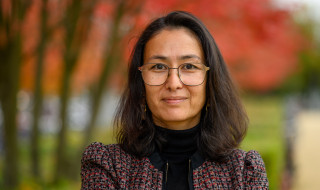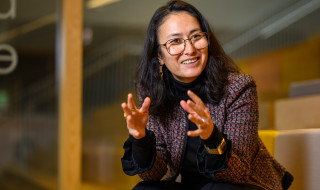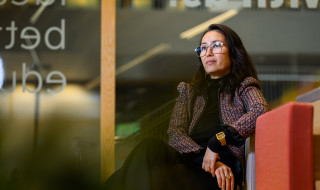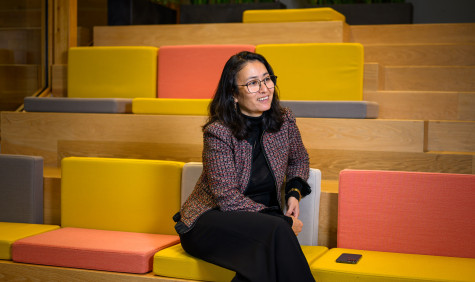"Universities are not learning from past experiences."
"Innovation, diversity and inclusion are not separate"
Farshida Zafar (45) has an impressive track record as an education innovator. She is director of Erasmus Centre for Entrepreneurship, where she works on entrepreneurship quality scans, effectiveness measurements of innovation programmes and educational courses around entrepreneurship. "In multidisciplinary teams, I am at my best," she says.
Universities still have big steps to take, according to Zafar, when it comes to connecting education to new generations of students. That institutions cannot follow technological trends and developments fast enough is one thing, she says, but the inability to learn from previous experiences is a crucial area for improvement.
"Technology is simply moving ten times faster than a university can handle, we know that, and have known that for a long time. We also know that with every new technology, we don't immediately know exactly how to use it in education. But we have had to deal with new technologies before in the last 20 years. It's really not the first time education has been disrupted as a result."
Transferring skills requires owning them yourself
The stress and panic, as well as frustration, that this kind of situation brings, surprises her. "Then I think, calm down and act peacefully, it will be fine," she says. Institutions need to face up to their ability to learn, because if you don't have enough of that in you as an organisation, you can't expect to design your education in such a way that it will work for the future generation of students either, Zafar clarifies. After all, if you can't do something yourself, you can't expect to teach it to someone else either.

Farshida Zafar, intrapreneur at Erasmus University Rotterdam
Zafar is entrepreneurial. "Look, you have entrepreneurs, who set up companies, boost the economy and dare to take risks. But you also have intrapreneurs, which are people who undertake or show entrepreneurial behaviour within organisations. Who spot new opportunities, build networks, take action and show initiative. They are those who have entrepreneurial skills and use them to get certain things done. Entrepreneurial skills can be learned and trained. We do no different at Erasmus Centre for Entrepreneurship. I think at Erasmus University Rotterdam (EUR), I am mainly an intrapreneur."
"Intrapreneurs are people who use entrepreneurial skills within organisations."
Innovation is the perspective of many different people
A career in education was never the plan. Entering the legal profession was. Until she came to the conclusion that she did not like the corporate culture around it. "In 2012, I entered teaching and within that, it was important for me to build new competences with each programme and project. That way, I learned to reflect more structurally and regularly and switch back to bring others along."
"Innovation, diversity and inclusion are not separate. You cannot innovate without including different perspectives in your change story."
She has never been in the same job for more than three years, and since 2022, Zafar has been director of the Erasmus Centre for Entrepreneurship. "Where I am now, I feel like a fish in water. I work with young, very talented people and collectively we have hugely diverse competences. There are also as many as 10 different nationalities in a team of about 15 employees."
Lots of diversity and inclusion you might think now. According to Zafar, when it comes to innovation, diversity and inclusion we think too much in boxes. "Innovation is not one person's perspective. Innovation is the perspective of lots of different people who subscribe to a vision and to opportunities. Innovation, diversity and inclusion are not separate. You cannot innovate without including different perspectives in your change story.
Flourishing in multidisciplinary teams
Gradually, she learned that innovation is not a hobby, but a dedicated job. "I used to be able to be busy with 30 things, but when you put the focus on innovation, you bring about more." Innovation, she believes, must also be reflected in strategy and felt at all levels. For this, it is necessary to redesign universities.

"When you focus on innovation, you bring about more."
"In multidisciplinary teams, I am at my best," says Zafar. "I am also not the type who can work from home. I need to be with people and be able to communicate in a direct line." She says the idea of multidisciplinarity is still not sufficiently reflected in education and sees opportunities in this for improving curricula and educational concepts.
More crossovers between wo, hbo and mbo
"In theory, the idea that assumes multidisciplinary and interdisciplinary cooperation by student teams is nice. But we have not implemented it so broadly and thoughtfully that you see this reflected in education." She also advocates more crossovers between the academic world and applied sciences and mbo's. Therein lies utility and necessity, because if you end up in working life, you are not just dealing with only lawyers or economists, you are among people from different socio-economic and cultural backgrounds and educational levels.
"Why do we still have hours long lectures in 2023? We know it doesn't work anyway."
Moreover, the world in which the new generations of students are now entering is different from that of 20 years ago. "And yet we stubbornly cling to forms of education that we know don't work. Just look at the lecture theatre. Why do we still have these lectures in 2023? Research shows that it does not work. Students already struggle with a 30-second TikTok, and then you start asking them to sit still for three quarters of an hour twice."
Worrying about a generation
In her compound family with three children aged 14 to 16, Zafar sees up close how this generation experiences education, and also how different learners' needs are. "One is a book eater and finds distraction in activities at school in a so-called science class with robots and 3D printers. The other follows the regular vwo programme and is very active outside school. And the third finds textbooks hopelessly outdated and wants to know why she has to memorise topography and when her teachers are going to tell her how to do taxes and insurance. I think she has a point."

Building ecosystems, doing more with digitalisation and putting social entrepreneurship on the map
She is seriously concerned about this generation. It is the generation that spent two years at home during the covid period. "After that period, school has continued as if nothing ever happened, while this group does lack a certain cohesion and formation due to the circumstances. And we act as if nothing is wrong. They do have issues with socialisation, with being overstrained and with expressing certain emotions."
Training students to become model thinkers
Zafar herself was trained in law and says that, apart from reading contracts, she doesn't do much anymore with her legal knowledge. According to her, you don't necessarily have to stay in the direction you study and it is more important to train people to become model thinkers.
From the Erasmus Centre for Entrepreneurship, she contributes to this by building ecosystems of which the organisation itself is also a part, moving with the times by doing more with digitalisation and putting social entrepreneurship on the map.
"Let's help students and also teachers create skills that allow them to be agile and flexible in the world, so that we can then, as a result, also move towards agile and flexible educational institutions."
Text: Maureen van Althuis
Photos: Jelmer de Haas
